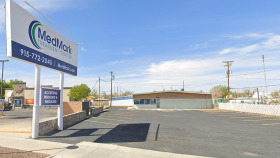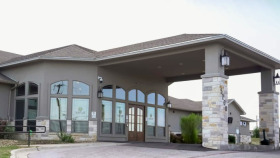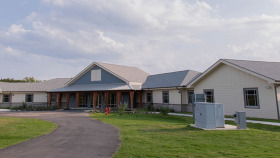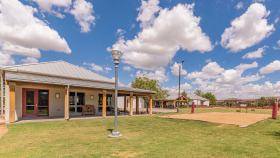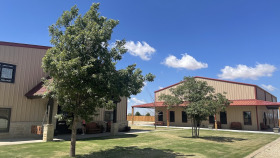Houston area which ranks as the number one area in Texas for drug addiction
Expert Insights
Drug trafficking across the Southern border was an undeniable reality of living in South Texas. But I began noticing a significant increase in the number of women remanded to the custody of the Texas prison system with the rise of opioid drug trafficking in Texas. Why are record numbers of women being sentenced to years behind bars for drug possession or delivery charges? Women often stay in relationships with men who deal in drugs because they’re afraid to leave, they’re dependent on the relationship, or they feel an obligation to keep the family together – and they stay despite knowing it puts them at a higher risk of going to prison. That’s why I’m so passionate about prevention in the areas of substance abuse, mental health, trauma, and poverty.
~ Natalie Baker
How Much Does Addiction Treatment in Texas Cost?
Texas is ranked 18th nationwide in terms of addiction treatment affordability, with an average cost of addiction treatment of $56,623.
- Medical detox is the most expensive, with an average cost of $139,596
- Inpatient rehab in Texas costs an average of $49,966
- Outpatient rehab in Texas costs an average of $8,302
- Outpatient methadone treatment is the most affordable, with an average cost of $7,377
Keep in mind these costs are averages for all types of addiction treatment, including medically supervised detox and residential inpatient rehab, both of which drive up the averages. These numbers also reflect the full cost of drug rehab without any insurance coverage. Most patients can expect to pay far less than these average for more typical outpatient treatment, MAT, and therapy.
Cost of Drug Rehab in Texas Compared to Nearby States
Here is how much addiction treatment costs in Texas vs nearby states like Louisiana, New Mexico, and Oklahoma.
Specific prices can vary due to:
- Type of treatment program (residential vs. outpatient)
- Amenities offered (such as luxury accommodations)
- Length of program (30 vs. 90 days or longer)
- Facility location (urban vs. countryside)
- Type of insurance accepted
- If the facility receives state or national funding
How to Pay for Drug Rehab in Texas
Whether or not you carry insurance, you can find a Texas rehab center that suits your needs and works with your financial situation. There are more than 500 addiction treatment facilities throughout the state, most of which offer a multitude of payment options.
Of the many rehab centers across Texas:2
Medicaid in Texas
Texas offers government-funded Medicaid healthcare insurance. This provides coverage for addiction and substance abuse treatment through state programs, such as the Texas Medicaid managed care program, called STAR.
Substance abuse treatment in Texas covered by Medicaid programs typically includes services such as crisis care and detox, medication assisted treatment (MAT), inpatient treatment, residential treatment, intensive outpatient care, regular outpatient programs, 12 Step facilitation, and faith-based programming.
Spanish-speaking programs, gender-specific programs, LGBTQ+ programs, and special programs for pregnant women are available at some facilities. You’ll need to check with your insurance provider regarding which options are available to you.
Medicare and Medicare Advantage
Medicare and Medicare Advantage healthcare plans in Texas cover mental health as well as substance abuse treatment for patients who have a diagnosis of substance abuse disorder.
Services vary by plan but may include detox, medication assisted treatment (MAT), inpatient or residential care, outpatient treatment (partial hospitalization programs or PHPs, intensive outpatient programs or IOPs, and regular outpatient visits). Coverage may also include individual, group, and family counseling; medication management; and any necessary psychiatric or diagnostic evaluations.
It is important to check with your insurance provider to find out the details of your plan’s substance abuse treatment coverage. Many policies limit the number of paid inpatient days and have other restrictions as well. You may also be responsible for deductibles and copays.2
Military Insurance
Insurance coverage available to military and military veterans include TRICARE insurance and benefits available through the Department of Veterans Affairs (VA). TRICARE covers substance abuse treatment for individuals diagnosed with substance use disorder (SUD).
Services provided may include residential/inpatient care, opioid treatment with detox and medication assisted treatment (MAT), plus outpatient treatment (intensive outpatient programs – IOPs, partial hospitalization programs – PHPs, and regular outpatient). Policies vary on the kinds of treatment services they offer, and there may be limits on certain services. Not all services will be offered at a particular facility.
Department of Veterans Affairs (VA) addiction treatment benefits for military veterans in Texas are offered through the VA Substance Use Disorder (SUD) program. This program covers inpatient, outpatient, and opioid treatment services. Services vary by VA facility.4
Major Private Insurance Carriers in Texas
- Aetna Healthcare
- Ambetter
- Amerigroup
- Anthem Blue Cross
- Baylor, Scott, & White Health Plan
- BlueCross/Blue Shield of Texas
- Celtic Insurance
- CHRISTUS Health Plan
- Cigna
- FirstCare Health Plans
- Healthsmart
- Humana
- Moda Health Plan
- Oscar Health
- Sendero Health Plans
- Texas First Health
- UnitedHealthcare
Tribal and Indigenous Programs
Indian Health Services (IHS)
The national Indian Health Services (IHS) provides evidence-based and culturally appropriate substance abuse services to members of American Indian and Alaska Native tribes in states with these populations.
Services that may be offered include mental health assessments; residential and inpatient care; outpatient treatment; individual, group, and family counseling; 12 Step groups, and skills/vocational training. Tribal drug treatment services vary by state and local location. A tribal enrollment card may be required to access services.
In Texas, the American Indian Center of Houston website offers links to low and no cost resources for substance use treatment in the greater Houston area.
The IHS Division of Behavioral Health coordinates with tribal organizations nationwide to share knowledge about behavioral health issues and programs for Native American Indians and Alaska Natives, including information on substance abuse treatment.
Native American Family Program (virtual/online)
The Betty Ford Hazelden organization offers a free monthly online substance abuse program facilitated by Native American credentialed mental health professionals.
Topics include how substance abuse affects families, “unhealthy helping,” boundaries, helpful communication, and sources of support. You must register for the program and have a computer that has video and microphone capabilities.
We R Native
This is a website for American Indian and Alaska Native adolescents and young adults in Texas and other states. Local leaders, or “ambassadors” coordinate between local and national groups.
We R Native provides information and resources for mental health, as well as addiction prevention and recovery. It offers chat groups, educational videos, and links to culturally sensitive and age-appropriate behavioral health services.
988 Suicide & Crisis Hotline for Native American Indian, Indigenous, and Alaska Natives
Funded by the Substance Abuse and Mental Health Services Administration (SAMHSA), this specialized hotline offers help in finding culturally specific mental health resources for American Indian and Alaska Native individuals.
The hotline’s 24/7 services include crisis intervention via phone or online chat, information on local addiction prevention, and recovery education and programs in the state of Texas as well as other states.
Other Low-Cost Options
Financial Assistance
To finance your drug rehab in Texas, you might consider acquiring a loan from a bank or from a family member or friend. You might also explore using a social media platform such as GoFundMe to try to raise funds.
Alternatively, if you are a member of a group that is sometimes subject to discrimination (ex: LGBTQ+; racial or cultural minority), you might find an advocacy group supportive of your population that may be able to offer you a scholarship or other financial aid to help pay for treatment.
Sliding Scale Payments
Often, rehab facilities will offer reduced payment options for potential clients who would otherwise not be able to afford treatment at their facility, even if they have insurance coverage. These fee reductions are often based on income.
If your income falls below the federal poverty level, you’d probably be able to receive the maximum amount of fee reduction that the facility offers. Because drug rehab costs vary greatly – for instance, whether it is a luxury facility or a state-funded facility – a sliding fee scale discount would reduce your potential cost, but it wouldn’t necessarily make every facility an affordable option for you.
Family Medical Leave Act (FMLA)
The 1993 FMLA was enacted to give employees job security when they access mental health care, including treatment for addiction. With FMLA, you can take up to 12 weeks of unpaid leave during a 12-month period and not lose your job. During your leave time your employer must preserve your health insurance coverage.
Substance Abuse and Mental Health Services Administration (SAMHSA) Block Grants
The Substance Abuse and Mental Health Services Administration, an agency of the U.S. Department of Health and Human Services, distributes block grants to all 50 states. This funding is available to local government and non-governmental organizations.
It is used to assist community mental health facilities in providing services, such as mental health crisis services, inpatient/residential addiction treatment programs, and outpatient addiction treatment. Inquire at the rehab facilities you are considering whether they have SAMHSA grants available.
Texas Addiction Resources
There are many opportunities to access low-cost or free addiction rehab in Texas. If you need alcohol or drug treatment and you have limited resources, you can find facilities that accept Medicaid, federal block grant funding, or state funding to help with payment.
Many facilities also offer a reduced fee, sliding scale payment structure. Sometimes, you can find funding opportunities at nonprofit organizations, as well as faith-based groups, and groups that support underserved populations. Examples include LGBTQ and other advocacy groups, plus military and veterans organizations and indigenous populations/tribal groups.
In the section below you will find suggestions for accessing these kinds of funding opportunities. When considering low-cost or free substance abuse treatment options, be sure to look for facilities that feature evidenced-based treatments in addition to affordability.
National Rehab Hotline: Texas
This Texas addiction hotline, affiliated with the National Rehab Hotline, is available 24/7. It serves all Texas residents, is free to use, and you can remain anonymous. You can receive help with addiction by calling 866-210-1303. You will be connected to a compassionate specialist who’ll listen to you and provide you with information and access to resources.
988 Texas
This is a mental health crisis and suicide hotline that connects you with a trained mental health counselor and gives you the option of having a mobile crisis team respond to you in person. By using this alternative to dialing 911, you will be sure to immediately access a mental health professional who is best able to address your situation. You can reach the hotline by either calling or texting 988 on your phone.
The LHMA (Local Mental Health Authority) Mental Health Crisis Hotline
The Texas Department of Health and Human Services (HHS) website provides a list of LMHA crisis services facilities and their crisis-call phone numbers. Mental health and substance abuse crises are both addressed, and the facilities are open 24 hours a day.
They provide prompt face-to-face crisis assessment, intervention, and relapse prevention follow-up services. The main LMHA crisis hotline number is (800) 621-1693.
Adult & Teen Challenge of Texas
This is a faith-based nonprofit organization that provides long-term residential recovery programs for adolescents and adults in 15 locations throughout Texas. They provide services including 12 Step programming, gender-separate programming, and recovery residences, including those for women and their children.
Adult & Teen Challenge of Texas offers recovery-focused life skills training plus academic and vocational training. They also provide supported employment. If you require medical detox, this will need to be accessed at a different facility prior to entering the program.
Recovery Resource Council
This nonprofit organization provides addiction screening, addiction education, prevention resources, and treatment for people who are uninsured or underinsured, as well as for veterans, indigent persons, and at-risk youth in North Texas.
Services include mental health and medical assessments, personalized treatment plans, supported housing, and employment. Special programs for families, homeless persons, veterans, and people who have co-occurring disorders and/or trauma are available.
National Alliance on Mental Illness (NAMI) Texas
NAMI Texas is a nonprofit organization that brings together families, caregivers, and other individuals who have been affected by mental illness, whether it is their own or that of someone they care about. NAMI Texas offers education and support and provides community outreach to raise awareness about mental health.
They help the mentally ill manage their symptoms and navigate the mental health system. They also advocate for the mentally ill when collaborating with other organizations.10
Homeward Bound
Homeward Bound is a non-profit addiction and mental health treatment agency in Texas, with five facility locations serving 25 Texas counties. They focus on diverting people from going to jail or prison and offer free and reduced cost substance abuse recovery services to low-income individuals. Detox, inpatient treatment, outpatient treatment, and aftercare services are provided.
Texas Drug Use Statistics
In Texas, approximately 27,000 adolescents and adults are receiving addiction treatment at over 800 rehab facilities.1 However, thousands more are in need of treatment for drug or alcohol addiction, and many others are at risk of developing a substance use disorder.2 Annually, there are nearly 3,100 drug-related fatalities in Texas and just over 296,500 emergency department visits related to substance use.3, 4
Here are some alcohol and drug use statistics for Texans:2

Approximately 24% engage in binge drinking at least once per month
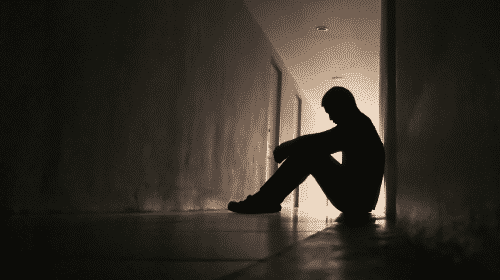
Nearly 49% have consumed alcohol in the past month

Just over 9% have used an illicit drug in the past month

Nearly 3% have used an illegal drug in the last month
Nearly 3.5% have misused prescription pain medications in the past year
Close to 1% have used methamphetamine in the last year
Nearly 1.5% have used cocaine in the past year
Drug Laws in Texas
Texas Good Samaritan Overdose Prevention Law
The Texas Good Samaritan Overdose law was implemented in Texas in 2021 with the intention to reduce concerns of individuals who were also using drugs or who were in possession of drug paraphernalia, who needed to call for help.
However, the Texas law has been criticized for having too many restrictions regarding helpers. For instance, if police are already on the scene, the law does not protect the helper. If police find evidence of another crime, or if the helper has a felony on their record, they are not protected and may be arrested.
Texas Marijuana Possession Law
Section 481.120 of the Texas Health and Safety Code
Possession and use of marijuana is still illegal in Texas. There is no lawful recreational use. Possession is a Class B misdemeanor if the amount of marijuana possessed is two ounces or less; a Class A misdemeanor if the amount possessed is four ounces or less but more than two ounces; and a felony if the amount possessed is five pounds or less but more than four ounces.
Texas Controlled Substance Act
Under this 1973 law, it became a crime to possess, distribute or manufacture controlled substances, and controlled substances were categorized into four categories, or schedules. Marijuana and synthetic marijuana are considered less dangerous in comparison to other controlled drugs, so penalties are less severe.
Penalties for possession of opioids and opioid derivatives start at 180 days to two years prison time, plus a $10,000 fine. The maximum penalty can be life in prison and up to $300,000 in fines, depending on the circumstances.
Americans with Disabilities Act (ADA) and Opioid Use Disorder Law
The Americans with Disabilities Act applies to people in recovery from opioid use disorder (OUD) or on legally prescribed medications for opioid detoxification. Such persons may not be discriminated against at work or in renting or buying housing.
Under the law, the person with an OUD must be in a supervised opioid drug treatment program or taking legally prescribed medication. Or they may have a history of OUD, even though they are not currently addicted.
Resources
- Substance Abuse and Mental Health Services Administration. (2020). National Survey of Substance Abuse Treatment Services (N-SSATS): 2020, Data on Substance Abuse Treatment Facilities.
- Substance Abuse and Mental Health Services Administration, Center for Behavioral Health Statistics and Quality. (2019-2020). National Survey on Drug Use and Health.
- Centers for Disease Control and Prevention, National Center for Injury Prevention and Control. (2019). Overdose Prevention Investment Snapshot.
- Texas Department of State Health Services. (2018). Hospital Emergency Department Data Collection 2016-2017. Texas Health and Human Services.
- Substance Abuse and Mental Health Administration. (2022) MAT Medications, Counseling, and Related Conditions.
- Texas Legislature Online. (2017). Bill Text.
- State of Texas Drug Use Patterns and Trends (2019). Bill Text.
- American Indian Center of Houston. https://aichouston.org/resources
- Texas Health and Safety code. https://statutes.capitol.texas.gov/Docs/HS/htm/HS.481.htm#481.120
- National Rehab Hotline Texas. https://nationalrehabhotline.org/texas/










